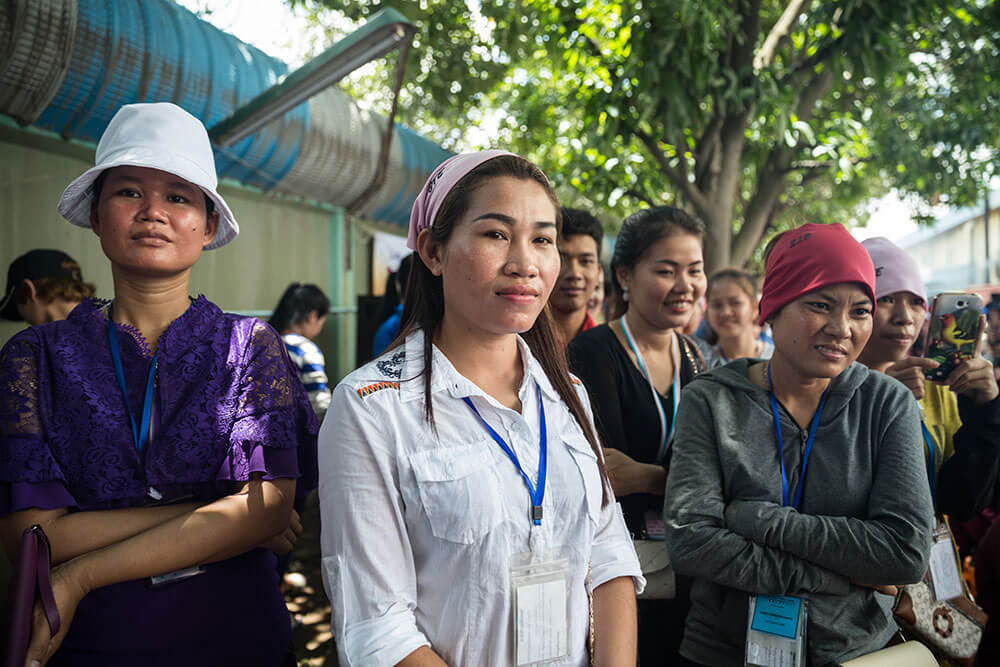Fitting reproductive health into factory life
It’s 5am and Linh is rolling out of bed in a cramped apartment in Vietnam. She has a long day ahead of her as a garment factory worker. She starts by preparing breakfast for her children and husband, as well as her husband’s family. They’ve barely finished eating before she’s rushing the kids to school and hurrying to work. If she’s even a minute late past her 7am start time, it will be recorded and her pay will be docked.
After a 12-hour shift, she heads home to prepare dinner, help the kids with their homework, and get them into bed. She’d like to avoid another pregnancy so she can focus on providing for her family. But there wasn’t a minute in the day where she could have made it to a health clinic to find out about contraception options.
Contraceptive use is widespread in Vietnam, but some groups have been left behind, including female factory workers. Hang Nguyen, Country Director for MSI Vietnam, shared insights about the barriers women in Vietnam still face accessing reproductive healthcare and how we’re reaching women where they are to ensure they can control their own futures.

Why focus on reaching factory workers?
Vietnam is becoming a hub of manufacturing for apparel, electronics, and other products for export. In the past 15 years, many companies have moved their operations to Vietnam. This has provided jobs for hundreds of thousands of workers. At MSI, we quickly realized that partnering with companies was an effective way to reach women who want to avoid pregnancy but don’t have the time or resources to easily access contraception.
We started our program in 2005 with 11 Adidas factories. Since then, we’ve supported factory health clinics and offered vouchers to our own network of clinics. We refined our models for peer educators, and brought additional reproductive healthcare like cervical cancer screening to the factory floor.
Sometimes, it takes some advocacy to convince companies that offering these programs will benefit their workers. But the data is clear that this helps women workers manage their health, which is especially important in the many workplaces that have mostly women workforces.
What are some barriers women face when managing their reproductive health?
Time is the biggest barrier. Women working on a production line can’t leave easily to visit a health clinic. They’re incentivized to work through the short breaks they’re allowed, As a result, we see problems like infections in menstruating women.
Limited choice of service providers also keeps women from accessing care. When factory health clinics don’t offer contraceptives, women are forced to use their one weekly day off to seek care. Their only option might be an expensive private clinic, which is cost-prohibitive.
The cost of more effective contraceptive methods is a problem. Long-term methods can be very expensive, costing up to 30% of a woman factory worker’s monthly income. We often hear from women whose husbands object to using condoms, but also object to the cost of a more effective method. So they’re really in a bind. That’s why the vouchers we offer are so important to making services affordable.

How is MSI helping?
We’re working hard to show global brands that this issue really matters to their workers. Improving workers’ health benefits everyone. We see that when women have access to these services, it allows them to maintain their employment and build more secure futures for themselves and their families.
Once we’ve made the business case for reproductive health, it’s time to put it into practice. There, flexibility is key. We structure our activities so that women can get the care they need without their employers objecting. We use donor funding to subsidize services so they’re affordable to workers.
Recently, I spoke with factory workers who came to an MSI mobile clinic. Nine out of ten of them told me that they had a child they hadn’t planned because the contraceptive method they had been using had failed. Every child should be by choice and that’s why we’re so committed to bringing affordable, effective contraception to women who otherwise might not have access to it at all.
Want to know more? Check out an interview with Hang on the podcast rePros Fight Back!






